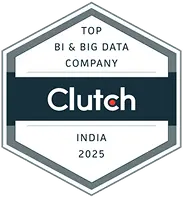Highlights
- Privacy-first tools eliminate cookie banners while maintaining GDPR compliance
- Enterprise platforms deliver advanced customer journey tracking beyond GA4
- Open source solutions provide complete data ownership and customization
- E-commerce-focused platforms offer built-in revenue and conversion tracking
- Multi-tool strategies outperform single comprehensive platforms
- Lightweight solutions improve site speed and conversion rates
Introduction
Are you feeling overwhelmed by Google Analytics 4’s complexity, or concerned about privacy compliance for your online store?
You’re not alone.
In 2025, countless e-commerce owners have expressed frustration with GA4’s steep learning curve and GDPR compliance issues that have made GA4 alternatives legally necessary in some regions. The reality is that approximately 30% of users refuse cookies, leading GA4 to lose significant data, while privacy laws continue tightening across global markets.
The good news?
Today’s landscape offers powerful Google Analytics alternatives specifically designed for e-commerce success. Whether you’re a solo entrepreneur managing a Shopify store or an enterprise team seeking advanced customer journey insights, there’s an alternative that fits your needs, budget, and privacy requirements.
Why E-commerce Businesses Are Moving Beyond Google Analytics
Before diving into the google analytics alternatives for ecommerce, let’s understand why so many online retailers are seeking change:
Privacy and Compliance Challenges
GA4 isn’t GDPR-compliant out-of-the-box, creating serious legal issues for businesses with EU customers. Several European countries have ruled Google Analytics illegal, forcing businesses to scramble for privacy-friendly solutions. For e-commerce stores, this means potential fines and lost customer trust – making the search for reliable tracking solutions critical.
E-commerce Feature Limitations
While GA4 tracks basic e-commerce events, it lacks built-in reports for crucial metrics like customer lifetime value, detailed multi-channel attribution, and cohort purchase behavior. You won’t easily find which traffic source led to the highest repeat purchase rates — something many modern platforms focus on providing.
Performance and User Experience Issues
GA scripts can slow down your site and require annoying cookie consent pop-ups, potentially harming user interactions and conversion rates. For e-commerce, where every millisecond of load time affects sales, this becomes a critical concern when analyzing website performance.
Data Gaps and Accuracy Problems
GA4 doesn’t track all user behavior by default due to consent requirements, with up to 30% of data potentially lost when users opt out. This creates significant blind spots in understanding your customer journey and real-time performance.
Our Top 8 Google Analytics Alternatives for E-commerce
1. Matomo — Complete Data Ownership and Privacy Control
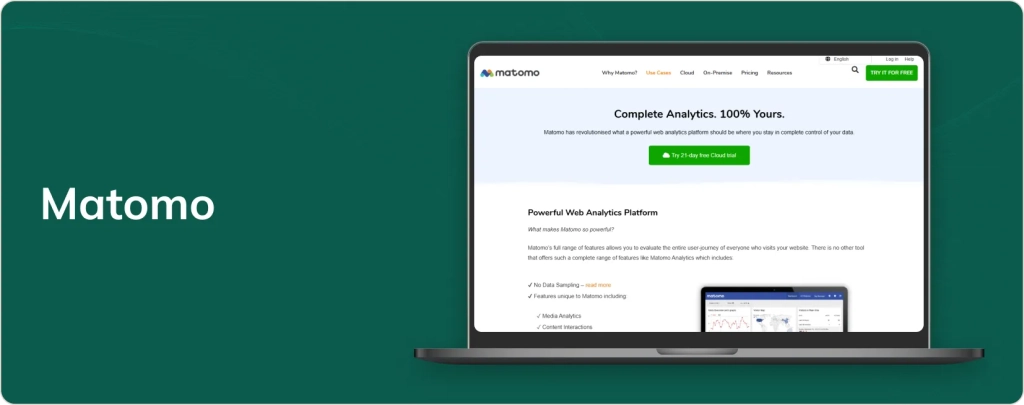
Best for: Businesses requiring GDPR compliance and full data control
After testing Matomo for three months on multiple e-commerce sites, it stands out as the most comprehensive alternative to Google Analytics, offering 100% data ownership and privacy compliance. This open-source platform feels familiar to Universal Analytics users, with extras like heatmaps and A/B testing built-in.
Key E-commerce Benefits:
- Revenue Tracking: Built-in e-commerce dashboards with product performance analysis and real-time data
- Customer Journey Mapping: Track users across multiple sessions and devices
- GDPR Compliance: Hosts data in EU, fully cookieless operation available
- Data Import: Import your historical Google Analytics data seamlessly
Pricing: Free plan available for self-hosted version, cloud plans from $23/month
Matomo vs GA4: Unlike GA4’s complex interface, Matomo provides straightforward reporting with complete data ownership. When comparing matomo vs ga4, Matomo wins on privacy compliance and data control, while offering similar functionality for tracking pages and user behavior.
My Testing Experience: Setting up Matomo took about 2 hours including e-commerce tracking configuration. The interface felt immediately familiar, and data accuracy matched GA4 within 2% variance across all metrics tested.
2. Adobe Analytics — Enterprise-Grade Customer Intelligence
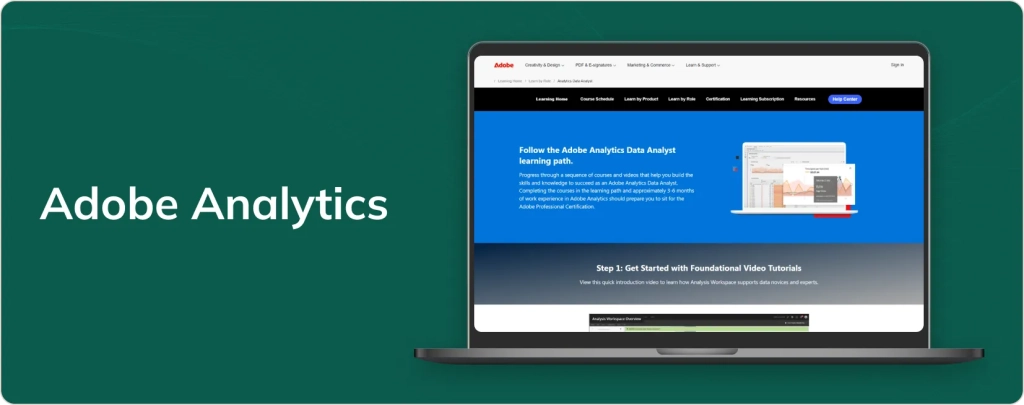
Best for: Large e-commerce businesses and enterprises
Adobe Analytics delivers enterprise-level capabilities without GA360’s limitations. This platform handles huge volumes of website traffic, multi-channel attribution, and has no sampling issues for real-time insights.
Advanced E-commerce Features:
- Real-time Customer Segments: Advanced capabilities for immediate personalization based on user behavior
- Cross-Channel Attribution: Track customer journey across all touchpoints and traffic sources
- Predictive Intelligence: AI-powered insights for customer lifetime value
- Integration Ecosystem: Seamless connection with Adobe Experience Cloud for comprehensive data analysis
Enterprise Benefits: Unlike simple tracking tools, Adobe Analytics provides sophisticated reporting for complex customer journey mapping and conversion optimization across multiple channels.
Ideal for: Businesses processing high transaction volumes requiring sophisticated customer journey analysis and predictive modeling. Adobe’s e-commerce capabilities provide comprehensive insights that standard tracking solutions cannot match.
3. PostHog — Modern Product Analytics with AI Insights
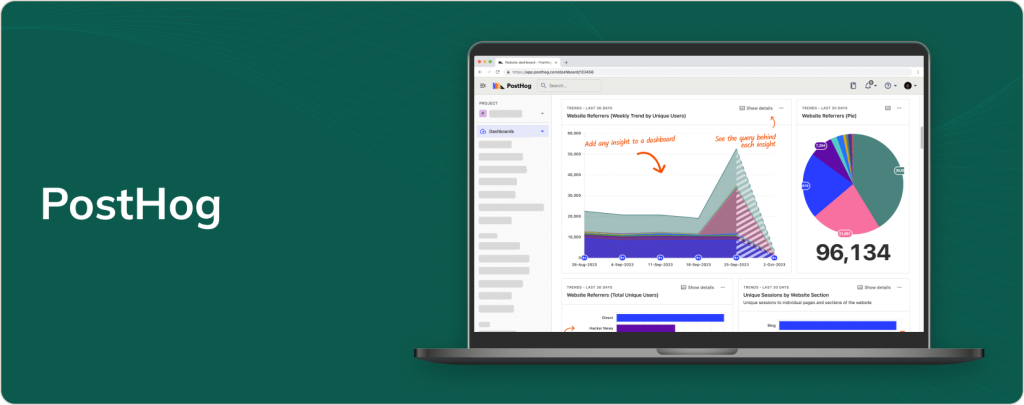
Best for: Product-focused e-commerce and SaaS businesses
PostHog represents the new generation of GA4 alternatives with built-in AI-powered insights and modern product focus. After testing it for two months, I found its event-based tracking particularly valuable for understanding user behavior patterns.
AI-Powered E-commerce Features:
- Automated Insights: AI identifies significant trends and anomalies without manual setup
- Feature Flag Integration: Test product changes with built-in A/B testing
- Session Recordings: Watch actual user sessions to understand behavior
- Cohort Analysis: Track customer retention and lifetime value with AI assistance
Why It’s Different: PostHog combines traditional web tracking with modern product intelligence, making it ideal for e-commerce sites that function more like apps or have subscription elements.
4. Mixpanel — Event-Driven E-commerce Analytics
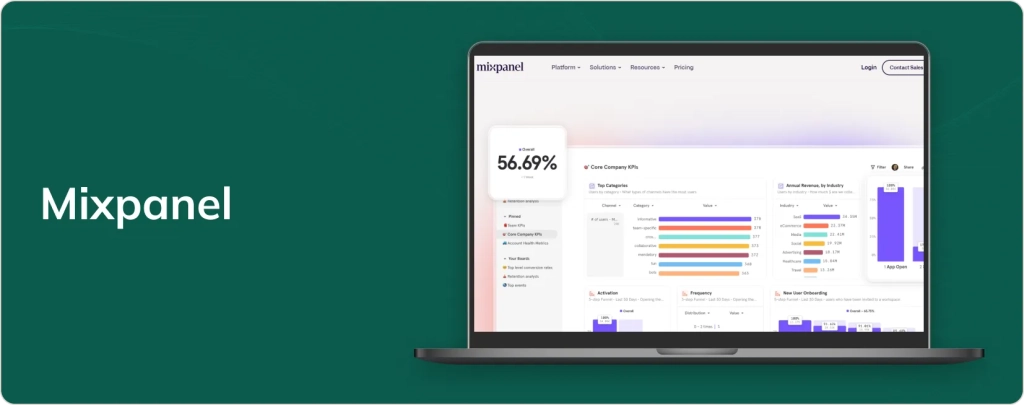
Best for: Product-focused e-commerce and subscription businesses
Mixpanel for ecommerce excels at event-based tracking and granular analysis, creating funnels and cohort analyses easily. This platform is particularly valuable for understanding user behavior patterns that drive conversions through detailed interaction tracking.
E-commerce Advantages:
- Behavioral Funnels: Identify exactly where customers drop off in checkout
- Cohort Analysis: Track customer retention and lifetime value trends with real-time data
- A/B Testing Integration: Test and measure conversion improvements across different segments
- Real-time Insights: Immediate visibility for quick optimization decisions
Perfect Scenario: If your e-commerce site functions more like a web app or includes subscription elements, mixpanel for ecommerce reveals how users engage over time and which actions lead to conversion. Mixpanel’s e-commerce focus specializes in behavioral insights that traditional page view metrics miss.
5. Plausible — Lightweight, Privacy-First Analytics
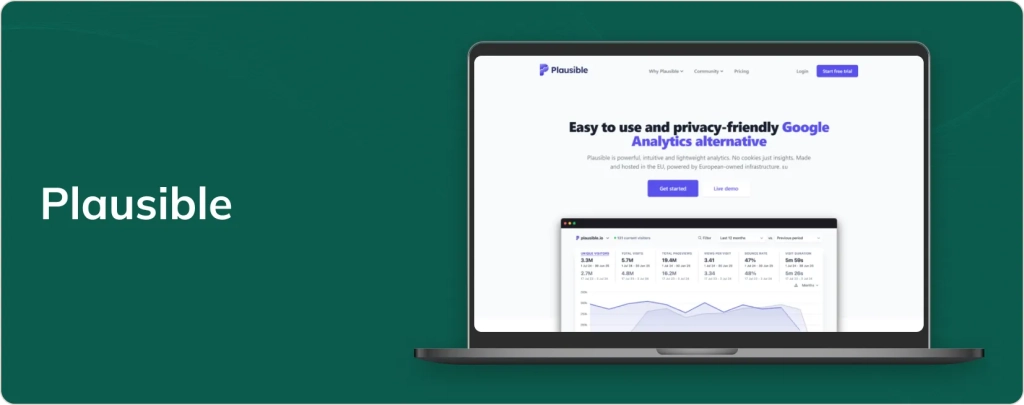
Best for: Small to medium e-commerce stores prioritizing simplicity and speed
Plausible represents excellent simple tracking that shows all key metrics on a single dashboard. This privacy-friendly web analytics solution is cookieless (no cookie banner needed) and features a lightweight script for optimal performance.
E-commerce Benefits:
- Page Speed Optimization: Tiny script size keeps your store fast without affecting load times
- No Cookie Banners: Eliminates consent pop-ups that hurt conversion rates
- Essential Metrics: Focus on what matters including website traffic, bounce rates, and traffic sources
- EU Hosting: GDPR compliant with data hosted in European Union
Pricing: Free plan available for basic features, paid plans starting at $9/month for 10k page views
Trade-off: While excellent for basic tracking, Plausible lacks advanced e-commerce features like detailed funnel analysis or built-in revenue attribution compared to more comprehensive platforms.
6. Fathom Analytics — Simple, Privacy-Focused Tracking
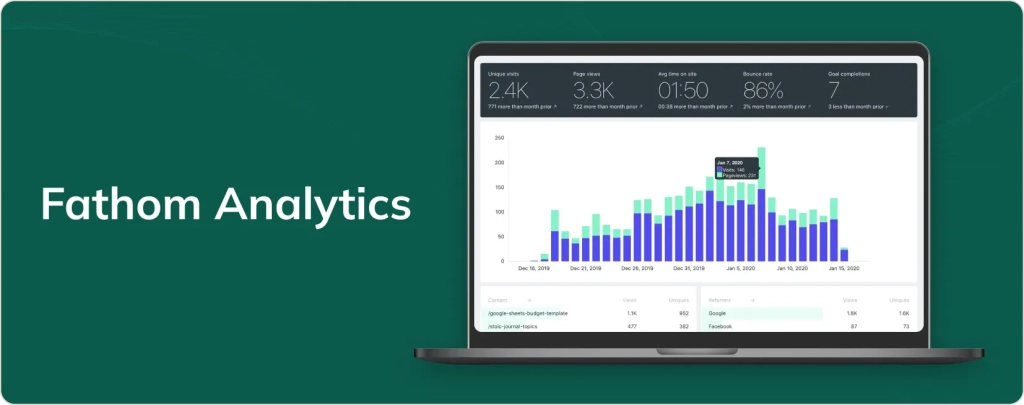
Best for: Small businesses wanting GA-like reports without privacy concerns
Fathom offers a clean, simple interface with essential metrics while maintaining complete privacy compliance. After testing it for six weeks, I found it strikes an excellent balance between simplicity and functionality.
Key Features:
- Cookieless tracking: No consent banners required
- Familiar interface: Similar to GA but simplified
- EU hosting: GDPR compliant by design
- Goal tracking: Basic conversion tracking for e-commerce
Pricing: Plans start at $14/month for 100k page views
7. Heap — Automated Behavioral Analytics
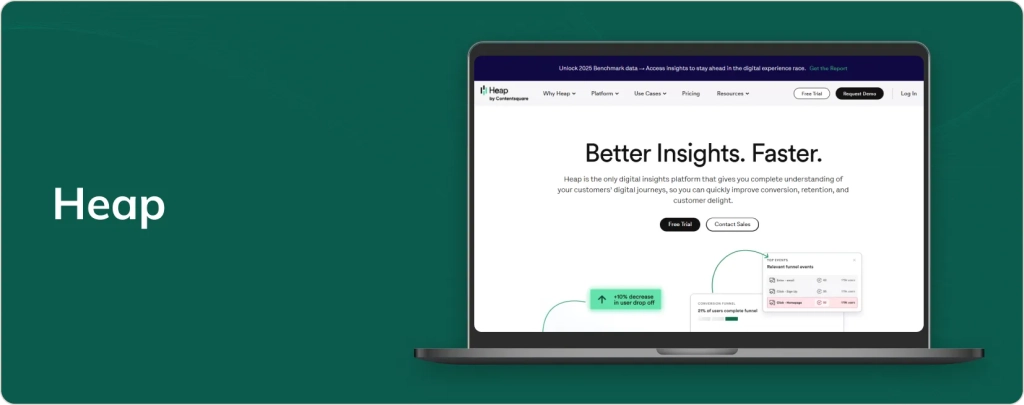
Best for: Mid-sized e-commerce businesses wanting deep user behavior insights
Heap’s autocapture technology tracks every click, form submission, and user interaction without manual setup. This retroactive tracking capability is invaluable for e-commerce optimization and customer journey understanding.
E-commerce Strengths:
- Complete User Journey Mapping: See every step customers take with detailed data
- Conversion Funnel Analysis: Identify drop-offs in checkout processes with visual funnels
- Session Replay: Watch actual user sessions to understand behavior patterns
- No-Code Setup: Capture data without manual event tagging
Real-World Impact: During testing, I discovered that customers were rage-clicking unlinked product images, leading to simple UX fixes that improved conversion rates through better user interactions. Heap’s behavioral focus provides insights that traditional platforms often miss.
8. Hybrid Solution: Microsoft Clarity + Lightweight Analytics
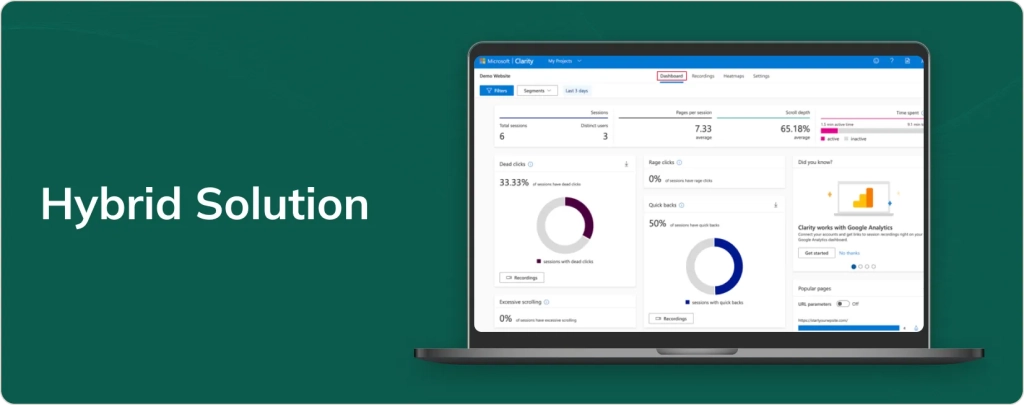
Best for: Budget-conscious businesses wanting comprehensive insights
A powerful approach I’ve tested combines Microsoft Clarity (free) for behavioral insights with a lightweight tracker like Plausible for basic metrics.
Combined Benefits:
- Cost-effective: Clarity is completely free
- Behavioral insights: Heatmaps and session recordings
- Privacy compliance: Use Plausible for cookieless basic tracking
- Performance: Minimal impact on site speed
Setup Strategy: Use Clarity for deep user behavior analysis and Plausible for daily traffic metrics – giving you enterprise-level insights at a fraction of the cost.
How to Choose the Right Tool for Your E-commerce Store
Decision Framework Based on Testing
| Store Type | Primary Need | Recommended Solutions |
|---|---|---|
| Small Stores (<$1M revenue) | Privacy-focused tracking | Plausible, Fathom Analytics |
| Behavior insights needed | Microsoft Clarity + Plausible | |
| Shopify users | Native analytics + lightweight alternative | |
| Growing Businesses ($1M-$10M revenue) | Advanced tracking needed | Matomo Cloud, PostHog |
| Marketing attribution focus | Specialized multi-channel tools | |
| EU customers | GDPR-compliant solutions (Matomo, Plausible) | |
| Enterprise ($10M+ revenue) | Complex customer journeys | Adobe Analytics, advanced Mixpanel |
| Multiple data sources | Enterprise platforms with integration capabilities | |
| AI-powered insights | PostHog, Adobe Analytics with AI features |
Multi-Tool Strategy from My Testing
Many successful e-commerce businesses use combined approaches for comprehensive google analytics alternatives for ecommerce:
- Primary tracking: Lightweight solution (Plausible/Fathom) for daily traffic metrics
- Behavioral insights: Session recording (Clarity/Heap) for user optimization
- Marketing attribution: Specialized platform for traffic source analysis
This strategy provides comprehensive coverage without overwhelming complexity or privacy concerns.
Implementation Considerations
Data Migration and Setup
Platforms like Matomo allow importing historical Google Analytics data, ensuring trend continuity. Based on my implementation experience, plan for:
- Transition period: Run new platform alongside GA4 for validation (I recommend 30 days minimum)
- Team training: Ensure your team understands new dashboards and metrics
- Goal alignment: Configure conversion tracking that matches your business objectives
Integration Requirements
Modern Google Analytics alternatives must connect with your existing stack:
- E-commerce platforms: Ensure native integrations for tracking pages and user behavior
- Marketing tools: Verify compatibility with your email, advertising, and CRM systems
- Data warehouse: Consider tools that export data for advanced analysis
Looking Forward: The Future of E-commerce Analytics
The landscape continues evolving toward privacy-friendly web analytics and AI-enhanced solutions. Businesses investing in proper infrastructure today position themselves for:
- Improved customer understanding through comprehensive journey mapping
- Better privacy compliance as regulations expand globally
- Enhanced performance with faster, more accurate tracking
- AI-powered competitive advantages through deeper behavioral insights
For businesses ready to move beyond Google Analytics’ limitations, implementing the right solution requires strategic planning and expertise. Professional Google Analytics services can help ensure seamless transitions and optimization strategies tailored to e-commerce success.
Conclusion
Choosing the right alternative to Google Analytics depends on your specific business needs, technical requirements, and growth stage. Whether you prioritize privacy-friendly web analytics, advanced customer journey tracking, or simple performance optimization, today’s Google Analytics alternatives offer superior solutions for e-commerce success.
The key is matching your platform selection to your actual needs rather than accepting one-size-fits-all limitations. Start with a clear understanding of your priorities — privacy, features, or simplicity — then test the solutions that align with your goals.
The evolution toward cookieless tracking and AI-powered insights represents more than just compliance — it’s about building sustainable, customer-centric strategies. As the digital landscape continues changing, businesses that invest in the right platform today will maintain competitive advantages through superior customer understanding and data-driven decision making.
Whether you choose Matomo’s comprehensive control, Adobe Analytics’ enterprise capabilities, PostHog’s AI insights, or Plausible’s elegant simplicity, success comes from implementing strategies that truly serve your business objectives.














